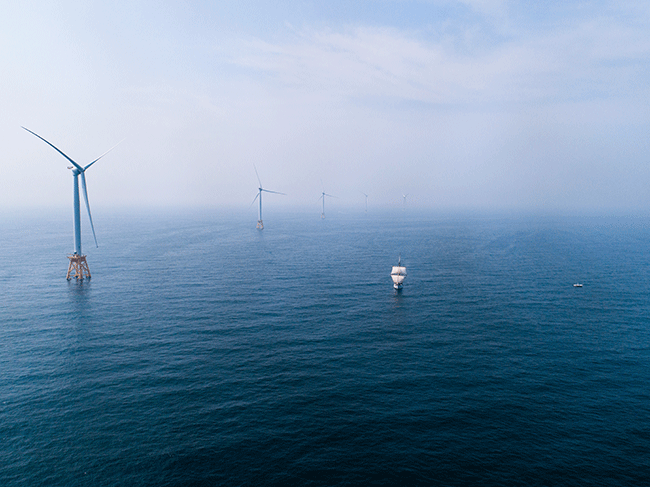Programs Blog
Investigating Tribal Rights & Coastal Infrastructure in the New England Area

Fiona Swope and Anna Winkler, Colorado College and University of New England
At first glance, the terms coastal infrastructure and tribal rights seem to be unrelated. Contrary to their appearance, they are in fact connected. This became apparent when a board member of the Mashpee Wampanoag Tribe, spoke to our class about tribal rights and how they intersect with the plan to build large scale offshore wind farms off the coast of New England. Throughout the infrastructure planning process, the US federal government has been in communication with the Wampanoag tribe about the location, scale, and potential impacts of offshore wind farms.
This open communication is an important aspect of the mutual understanding that tribes operate as a separate entity, similar to a state. The aspect of the project that the Mashpee Wampanoag Tribe is most concerned about is the plan to build underwater cables (to carry the electricity from the wind turbines to land) under Nantucket Sound. The ground under Nantucket Sound is sacred land for the Wampanoag tribe because a couple thousand years ago, when ocean sea levels were lower, the waterway was dry land that the Wampanoag’s lived and traveled between what we know today as Nantucket, Martha’s Vineyard, and Cape Cod.
Today marine archeologists have found underwater villages in the sound, and the Wampanoag’s are concerned about the impact of the cables. Our guest speaker made it clear to the class that in general, the Mashpee tribe is pro-wind farm, and they just want to make sure their cultural sites are preserved, even if they’re under the ocean.
As Massachusetts residents, the presentation by a Wampanoag representative from the Mashpee tribe resonated with Fiona and me, leaving us with many questions. Why (as Massachusetts residents) were we so unaware about the tribal presence on Cape Cod? Why were we not hearing about the involvement of tribes in important projects such as these important offshore wind projects? We believe that tribal rights to land conservation are extremely important and that they have been grossly overlooked in the past and are still being overlooked now.
Evolving goals for our ongoing project:
Inspiring individual action- We would like to use this project as a way to call others to actively learn more about the people that were on this land well before we were. These actions can be simple. For example, to show our support, Fiona and I will be attending the Day of Mourning that occurs on Thanksgiving each year in Plymouth, MA.
Raising general awareness about the offshore wind project. We would like to raise awareness about the offshore wind project by developing potential ways to inform the public that target all audiences especially college aged students.
– Fiona Swope and Anna Winkler, Colorado College and University of New England
Recent Posts from the Ships
- Ocean Classroom 2024-A collaborative high school program with Proctor Academy
- Collaborations and Long-term Commitments: SEA’s Caribbean Reef Program Sets a Course for Coastal Programs that Compliment Shipboard Experiences.
- Sea Education Association students prepare for life underway using state of the art nautical simulation from Wartsila Corporation.
- SEA Writer 2022, Magazines From the Summer SEA Quest Students
- Technology@SEA: Upgrades Allow Insight into Ocean Depths
Programs
- Gap Year
- Ocean Exploration
- High School
- Science at SEA
- SEA Expedition
- SEAScape
- Pre-College
- Proctor Ocean Classroom
- Protecting the Phoenix Islands
- SPICE
- Stanford@SEA
- Undergraduate
- Climate and Society
- Climate Change and Coastal Resilience
- Coral Reef Conservation
- Marine Biodiversity and Conservation
- MBL
- Ocean Exploration: Plastics
- Ocean Policy: Marine Protected Areas
- Oceans and Climate
- Pacific Reef Expedition
- The Global Ocean: Hawai'i
- The Global Ocean: New Zealand